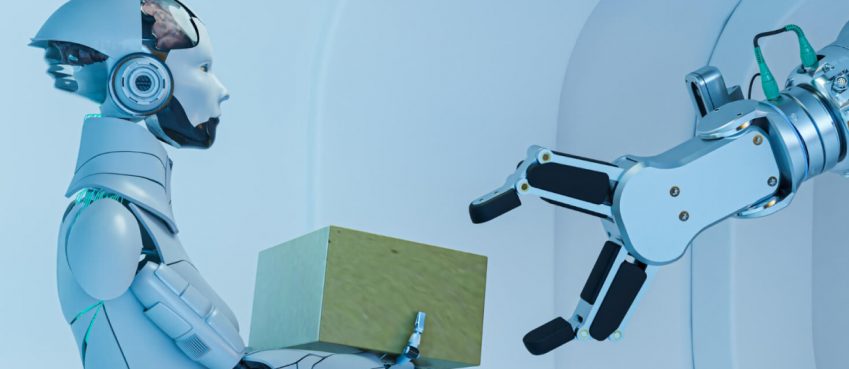
Robots are often portrayed as futuristic servants in movies and TV. Robots are an integral part of many industries’ day-to-day operations, including construction and retail. As technology improves, robots can move faster and have conversations to complete more complex tasks.
These changes have meant that roboticists will be in high demand. According to Indeed, the median salary for a robotics engineer is over $100,000 per year. According to the Bureau of Labor Statistics, the projected job growth in the field of mechanical and architectural engineering (of which robotics is a component) is 4 percent between 2018-2028. This is comparable to the rate of growth for all occupations.
Trends in automation suggest faster job growth for those who design and build robots, as well as the programmers that run them. McKinsey & Company projects that half of all work activities could be automated. This would have a global economic impact of up to $4.5 trillion for advanced robotics, and as high as $2 trillion for autonomous vehicles.
For example, warehouses have robots that lift and stack large boxes. This reduces the risk of injuries on the job and lowers insurance and healthcare costs.
These new roles are highly competitive and you can improve your skills to keep up with the changing job market. Here are the top robotics concentrations and the skills you will need to land a job.
3 Major Robotics Specializations
Robotics combines multiple disciplines: computer science and mechanical and industrial engineering as well as electrical and computer engineering.
1. Computer science
This course focuses on the robot’s higher-level controls systems. It uses machine learning (ML), and complex artificial intelligence (AI). Robert Platt is an assistant professor at Northeastern’s Khoury College of Computer Science.
He says, “You are telling the robot what it should do.” For example, an autonomous car may have mechanisms that allow it to detect pedestrians and stop signs. Programs that enable a drone to navigate through a building, take photos, or fly at a specific height may be available.
2. Mechanical and Industrial Engineering
Platt states that Mechanical and Industrial Engineering are responsible for lower-level control systems and mechanisms. These systems include the rotor in a drone, the steering mechanism in an autonomous vehicle, and a “traditional” robotic that performs one task such as a robotic arm for an assembly line. These systems must be designed with safety and stability in mind, especially when they will be used alongside people.
3. Electrical and Computer Engineering
We will be looking at the interplay between high-level and lower-level control systems. This involves the development of protocols for system integration. Platt states that there may be overlaps between the discipline of robotics and computer science.
6 Essential Robotics Skills
Although responsibilities in specific roles will vary, there are several universal skills all robotics professionals should know.
1. Math and Science
Robotics company RobotIQ describedmathematics to be one of the core skills in robotics that you can’t learn by doing it yourself. A strong background in science and mathematics is essential for a career in robotics.
- Calculus and algebra will help you to write equations and formulas that represent abstract concepts that robots manipulate.
- You can learn geometry and physics to understand how a robot moves in order reduce wear and tear and prolong the life of your equipment.
- Applied mathematics is the application of mathematics to solve problems in engineering and science. It will allow you to tackle challenges like predicting how a robot might move under certain conditions.
2. Programming
A career in robotics will require knowledge of most popular programming languages like C++, Python and Java. However, there are key differences between programming to develop mobile apps or software for robotics.
- Software applications are more likely to interact with each other than one another, as in a website that requests information from a database. Robots interact with both software and hardware.
- RobotIQ identifies that many industrial robots are programmed in proprietary languages. There’s a good possibility that you will also be working with robots made by multiple manufacturers.
- Programming high-level robotic systems requires highly technical AI and ML algorithms. Platt states that this is where programming meets theoretical understanding of robots’ working. Employers have a hard time finding those skills.
3. Working on a Team
Although robotics is primarily technical work, certain soft skills can be beneficial, Platt states. Particularly, it is important to be a team player. You want to have valuable skills, such as the ability write complex AI algorithms. But you also need to be able to work in a team.
Platt says that unless you are working at a small startup you can expect to work with five to six other engineers, a product developer, a project manager and a user-experience expert. The team will follow an Agile project manager process that involves iterative development, testing, and receiving feedback.
4. Tackling Complex Problems
Planning and building working specialized frameworks is clearly a basic mechanical technology ability, however have the option to sort out why a framework isn’t working as expected. In the event that it’s a mechanical issue, you’ll need to know the prescribed procedures for making maintenance.
In the event that it’s a product issue, you’ll should be prepared to search for blunders or bugs in the code. What’s more, in the event that it’s anything but promptly clear what the issue is, you’ll need to give your critical thinking abilities something to do to evaluate the circumstance and track down a potential arrangement.
Much of the time, critical thinking in advanced mechanics can involve experimentation. As well as rehearsing steadiness, you can assemble your critical thinking abilities through experience.
An experiential learning program, for example, the Master of Science in Robotics program in the Northeastern University College of Engineering, gives understudies admittance to nearby progressed labs and examination focuses just as modern accomplices like Boston Dynamics, iRobot, and the Toyota Research Institute.
Also read: What Does “FedEx Shipment Exception” Status Mean? What To Do & How To Handle It?
5. Thinking Creatively
A smidgen of imagination can go far for a mechanical technology proficient. It very well may be helpful for taking care of issues, for example, utilizing a current part in another way or concocting a shiny new plan out and out.
Innovativeness and collaboration go connected at the hip, as well—an eagerness to work with others and acknowledge their commitments can help the whole group think of a groundbreaking thought or diverse arrangement.
Imagination can likewise help your showcasing and business advancement abilities. PC helped plan and drafting (CADD) programming organization Autodesk takes note of that these are especially important business abilities for a mechanical technology engineer who has planned another item.
As well as depicting the specialized advantages of an item, you’ll need to persuade deals staff, advertisers, chief pioneers, and eventually clients that your item merits their time and cash.
6. Dynamic Learning
The field of mechanical technology is continually evolving. There are new programming dialects to learn, new Art ideas to test, and new and more strong materials to work with. A mechanical technology designer can show their worth by continually finding out about these progressions and applying them to new fields of mechanical technology.
One model is telepresence robots that can be worked distantly and can move, talk, and tune in. The news site Robotics Tomorrow depicts various use cases, for example, going to a class or meeting most of the way across the world, observing the states of patients in an emergency clinic or nursing home, or getting weighty or unsafe materials across an assembling office.
These kinds of robots can possibly change the way the world works and learns, yet assembling and keeping up with them will require new plans, designing strategies, and programming programs.
Also read: What Is Forex Trade? 5 Untold Forex Trading Benefits + Expert Tips For Higher Forex Profit
Planning for a Robotics Career
Quite possibly the best approaches to acquire these abilities is by seeking after a postgraduate education, similar to Northeastern’s Master of Science in Robotics.
Through an actually difficult educational plan, involved learning, and industry center situations, you can acquire an extensive comprehension of these advanced mechanics abilities to help you hang out in the field and have a groundbreaking effect on society.
To get familiar with getting the experience you need for a successful profession in mechanical technology, click on the standard underneath to investigate the program page.
Top 10 News
-
01
10 Exciting iPhone 16 Features You Can Try Right Now
Tuesday November 19, 2024
-
02
10 Best Anatomy Apps For Physiologist Beginners
Tuesday November 12, 2024
-
03
Top 10 Websites And Apps Like Thumbtack
Tuesday November 5, 2024
-
04
Top 10 Sites Like Omegle That Offer Random Video Chat
Monday October 21, 2024
-
05
Entrepreneurial Ideas To Make 5K In A Month (10 Realistic Wa...
Monday October 7, 2024
-
06
[10 Best] Cash Advance Apps Like Moneylion And Dave (No Cred...
Friday September 20, 2024
-
07
Top 10 Richest Person In The World
Tuesday August 27, 2024
-
08
Top 10 Unicorn Startups In The World (2024-25)
Monday August 26, 2024
-
09
Top 10 IT Companies In The World By Market Cap
Thursday August 22, 2024
-
10
[10 New] Best OnionPlay Alternatives To Stream TV Shows And ...
Tuesday June 11, 2024







